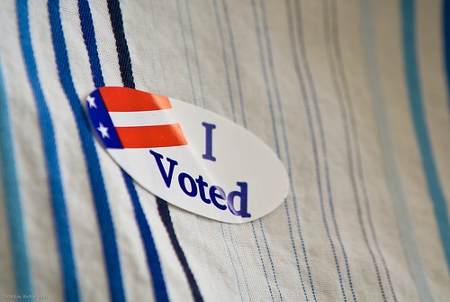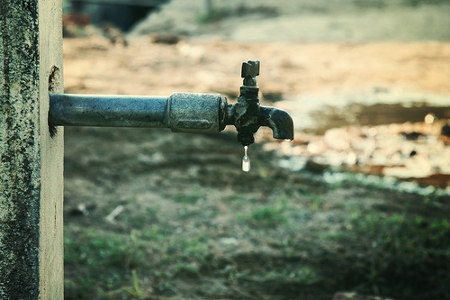

 It is incredibly unlikely that any one person’s vote will change the outcome of an election and individuals derive no immediate benefit from the actual act of voting, making it a deeply altruistic act. Following this idea, Toby Bolsen, Paul J. Ferraro, and Juan Jose Miranda examine whether voters are also more likely to take action on other issues that have a positive societal impact, but no direct benefit to them. They found that when asked to conserve water during a drought, frequent voters, regardless of political affiliation, made more significant reductions to their water consumption than non-voters.
It is incredibly unlikely that any one person’s vote will change the outcome of an election and individuals derive no immediate benefit from the actual act of voting, making it a deeply altruistic act. Following this idea, Toby Bolsen, Paul J. Ferraro, and Juan Jose Miranda examine whether voters are also more likely to take action on other issues that have a positive societal impact, but no direct benefit to them. They found that when asked to conserve water during a drought, frequent voters, regardless of political affiliation, made more significant reductions to their water consumption than non-voters.
Are voters more cooperative in general than other citizens? Do conservatives and liberals respond differently when asked to contribute to the public good? In democracies, the answers to these questions can affect how governments solve the most pressing issues of our time. The answers also shed light on how social norms operate in a society. Take voting, for example. Despite the infinitesimally small chance that any one individual’s vote will affect an election outcome, millions of people participate in local, state, and national elections each year in the United States.

Decades of research provide insights into the reasons why people vote. People are not guided by cost-benefit calculations based on the likelihood that one’s vote will be the deciding ballot cast. They are guided by a belief that voting fulfills a social norm – it is viewed as “doing one’s part” to help provide something that benefits the collective. Democratic societies promote voting as a socially-valued obligation. On voting days, citizens walk around their offices and neighborhoods proudly sporting “I voted today” stickers on their chests.
If social norms motivate voters to vote, these same cooperative predispositions might also make voters more likely to take actions that benefit others in different settings. We recently examined whether frequent voters are more willing to take collectively beneficial action in the context of a request for water conservation during a drought in the southeastern United States. To do this, we merged data from a large field experiment (> 100,000 households) conducted in partnership with the Cobb County Water District, in Cobb County, Georgia, with voter turnout data for all primary and general elections between 1990 and 2008. We studied the amount of water each house used between June and September 2007.
Our measure for vote frequency was equal to the number of times every registered voter in the household voted in a primary, general, or special election (1990-2008) divided by the number of times every registered voter in the household could have voted, which depended on each person’s birth year. We created this measure to assess whether there is a relationship between past voting behavior and a household’s response to receiving a randomized letter requesting voluntary water conservation. If frequent voters are more likely than infrequent voters to reduce water use as a result of receiving a letter via first-class mail requesting cooperation, then it suggests that social norms motivate some people to take actions that are socially-valued, and which benefit others, across settings.
We find that registered voters who have no voting history and who received a letter requesting water conservation reduce their water consumption by 691 gallons on average over the summer. In contrast, the most frequently voting households who received a letter reduced their water consumption by an average of 2,507 gallons over this same period (a 6.2% overall reduction in water use over the summer of 2007). To give this some perspective, consider that a five minute shower uses between 10 and 25 gallons of water, and the average top-load washing machine between 40 and 45 gallons of water per usage.

To plumb the depths of the role of social norms further, we explored whether Democrat or Republican households were more responsive to receiving a letter requesting cooperation for an environmental objective. Lots of survey data suggests liberals and conservatives have very different views on environmental goals, yet there is little evidence about how they actually react when asked to contribute to environmental collective actions. To address this lack of evidence, we explore whether Democrat or Republican households were more responsive to receiving a letter requesting water conservation. Our measure for partisanship was based on the number of times every registered voter in a household had voted in a Democratic primary election versus the number of elections each registered voter in a household had voted in a Republican primary election.
To answer this question, we looked at Democrat and Republican primary voters who received a pro-social letter and find that they are indistinguishable in terms of their response to a water conservation request – that is, both groups significantly reduce water use upon receiving a letter relative to non-primary voting households that did not receive a letter; however, in additional analyses that made use of pre- and post-experimental measures of household water use, we find that the decrease in water use among Democrat and Republican households is due to an unobservable characteristics common to both groups of primary voters, such as an internalized sense of civic-mindedness that motivates some individuals to participate in collectively beneficial endeavors.
Understanding why some citizens, but not others, take action for the public good lies at the heart of political science. The degree to which individuals are willing to make voluntary contributions to the public good determines the policies that need to be in place to reach outcomes beneficial for everyone. What is novel about our study is that it is the first to examine actual behaviors in different settings and look at whether frequent voters are more likely to participate in an unrelated collective action, in a different domain, when presented with an explicit request for cooperation.
This article is based on the paper “Are Voters More Likely to Contribute to Other Public Goods? Evidence from a Large-Scale Randomized Policy Experiment,” in the American Journal of Political Science.
Please read our comments policy before commenting.
Note: This article gives the views of the authors, and not the position of USApp– American Politics and Policy, nor of the London School of Economics.
Shortened URL for this post: http://bit.ly/1lU9w2I
_________________________
 Toby Bolsen – Georgia State University
Toby Bolsen – Georgia State University
Toby Bolsen is an Assistant Professor of Political Science at Georgia State University. His research interests include the study of political behavior, public opinion, media and communications, experimental methods, and U.S. energy policy.
_
 Paul J. Ferraro – Georgia State University
Paul J. Ferraro – Georgia State University
Paul J. Ferraro is a Professor of Economics at the Andrew Young School of Policy Studies at Georgia State University. His research interests include the design and evaluation of environmental policy, with an emphasis on biodiversity and ecosystem protection, as well as experimental methods and behavioral economics.
_
 Juan Jose Miranda – The World Bank
Juan Jose Miranda – The World Bank
Juan Jose Miranda is an economist at the World Bank. His research interests include environmental and natural resource economics, development economics, applied econometrics/program evaluation, and experimental/behavioral economics. You can follow him on Twitter @unicojm.



